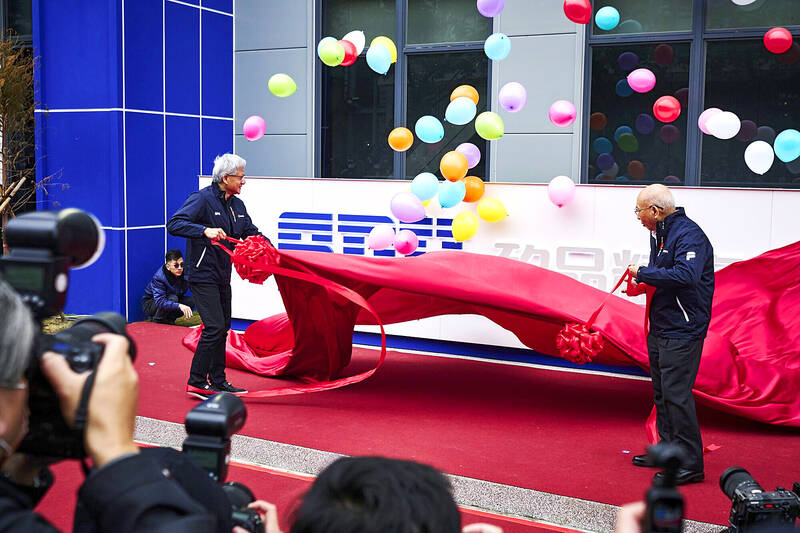Nvidia Corp’s demand for advanced packaging from Taiwan Semiconductor Manufacturing Co (TSMC, 台積電) remains strong though the kind of technology it needs is changing, Nvidia CEO Jensen Huang (黃仁勳) said yesterday, after he was asked whether the company was cutting orders.
Nvidia’s most advanced artificial intelligence (AI) chip, Blackwell, consists of multiple chips glued together using a complex chip-on-wafer-on-substrate (CoWoS) advanced packaging technology offered by TSMC, Nvidia’s main contract chipmaker.
“As we move into Blackwell, we will use largely CoWoS-L. Of course, we’re still manufacturing Hopper, and Hopper will use CowoS-S. We will also transition the CoWoS-S capacity to CoWos-L,” Huang said on the sidelines of an event by chip testing and packaging company Siliconware Precision Industries Co (SPIL, 矽品精密) in Taichung.

Photo: An Rong Xu, Bloomberg
“So it’s not about reducing capacity. It’s actually increasing capacity into CoWoS-L,” he added.
Hopper refers to Nvidia’s graphics processing unit (GPU) architecture platform before the company announced Blackwell in March last year.
Nvidia has so far relied mainly on one type of CoWoS technology, CoWoS-S, to combine its AI chips.
TF International Securities Group Co (天風國際證券) analyst Kuo Ming-chi (郭明錤) on Wednesday said Nvidia was shifting its focus to a newer type of technology, CoWoS-L, and that suppliers would be affected.
In addition, local media reported that Nvidia was cutting CoWoS-S orders from TSMC in a potential hit to the Taiwanese chip foundry’s revenue.
Nvidia has been selling its Blackwell chips as quickly as TSMC can make them, but packaging has remained a bottleneck due to capacity constraints.
Still, Huang said that the amount of advanced chip packaging capacity was “probably four times” the amount available less than two years ago.
He declined to answer questions on the new US export restrictions that limit AI chip exports to most countries except for a select group of close US allies including Taiwan.
Huang was in Taichung yesterday to attend the opening ceremony of a new SPIL plant in the city’s Tanzi Technology Industrial Park (潭子科技產業園區).
“The technology that we’re working on is becoming more sophisticated. Chips are getting more and more complex, and the packaging technology will need to evolve as well. What’s even more exciting is the integration of silicon photonics, enabling us to connect multiple packages into one massive system,” Huang said.
He said Nvidia’s partnership with SPIL would be instrumental in pushing the boundaries of innovation in coming years.
Huang also addressed the broader implications of AI development, saying that AI combined with robotics will bring tremendous benefits to Taiwan’s world-leading electronics industry.
SPIL expressed enthusiasm for the collaboration, stating that Huang’s visit highlights the strong relationship between the two companies.
Industrial sources told CNA that Huang’s visit to SPIL aims to secure production of 3D CoWoS packaging services used in AI chip manufacturing.
TSMC, which has entered advanced CoWoS development, has outsourced the services to SPIL to meet strong global demand, the sources said.
As its CoWoS services have secured certification, SPIL is expected to raise production gradually starting from the second quarter of this year, the sources added.
It was the first public event for Huang in Taiwan this year. He is also expected to attend Nvidia Taiwan’s annual Lunar New Year party this week in Taipei.
In addition, Huang is to meet with Taiwanese tech executives from Hon Hai Precision Industry Co (鴻海), Quanta Computer Inc (廣達) and Inventec Corp (英業達), which all roll out AI servers powered by Nvidia’s chips, as well as PC brands Asustek Computer Inc (華碩) and Micro-Star International Co (微星).
Huang, who was born in Tainan, Taiwan’s historic capital, before emigrating to the US at the age of nine, is hugely popular in the country.
Additional reporting by CNA and AP

NEW IDENTITY: Known for its software, India has expanded into hardware, with its semiconductor industry growing from US$38bn in 2023 to US$45bn to US$50bn India on Saturday inaugurated its first semiconductor assembly and test facility, a milestone in the government’s push to reduce dependence on foreign chipmakers and stake a claim in a sector dominated by China. Indian Prime Minister Narendra Modi opened US firm Micron Technology Inc’s semiconductor assembly, test and packaging unit in his home state of Gujarat, hailing the “dawn of a new era” for India’s technology ambitions. “When young Indians look back in the future, they will see this decade as the turning point in our tech future,” Modi told the event, which was broadcast on his YouTube channel. The plant would convert

‘SEISMIC SHIFT’: The researcher forecast there would be about 1.1 billion mobile shipments this year, down from 1.26 billion the prior year and erasing years of gains The global smartphone market is expected to contract 12.9 percent this year due to the unprecedented memorychip shortage, marking “a crisis like no other,” researcher International Data Corp (IDC) said. The new forecast, a dramatic revision down from earlier estimates, gives the latest accounting of the ongoing memory crunch that is affecting every corner of the electronics industry. The demand for advanced memory to power artificial intelligence (AI) tasks has drained global supply until well into next year and jeopardizes the business model of many smartphone makers. IDC forecast about 1.1 billion mobile shipments this year, down from 1.26 billion the prior

People stand in a Pokemon store in Tokyo on Thursday. One of the world highest-grossing franchises is celebrated its 30th anniversary yesterday.

Zimbabwe’s ban on raw lithium exports is forcing Chinese miners to rethink their strategy, speeding up plans to process the metal locally instead of shipping it to China’s vast rechargeable battery industry. The country is Africa’s largest lithium producer and has one of the world’s largest reserves, according to the US Geological Survey (USGS). Zimbabwe already banned the export of lithium ore in 2022 and last year announced it would halt exports of lithium concentrates from January next year. However, on Wednesday it imposed the ban with immediate effect, leaving unclear what the lithium mining sector would do in the